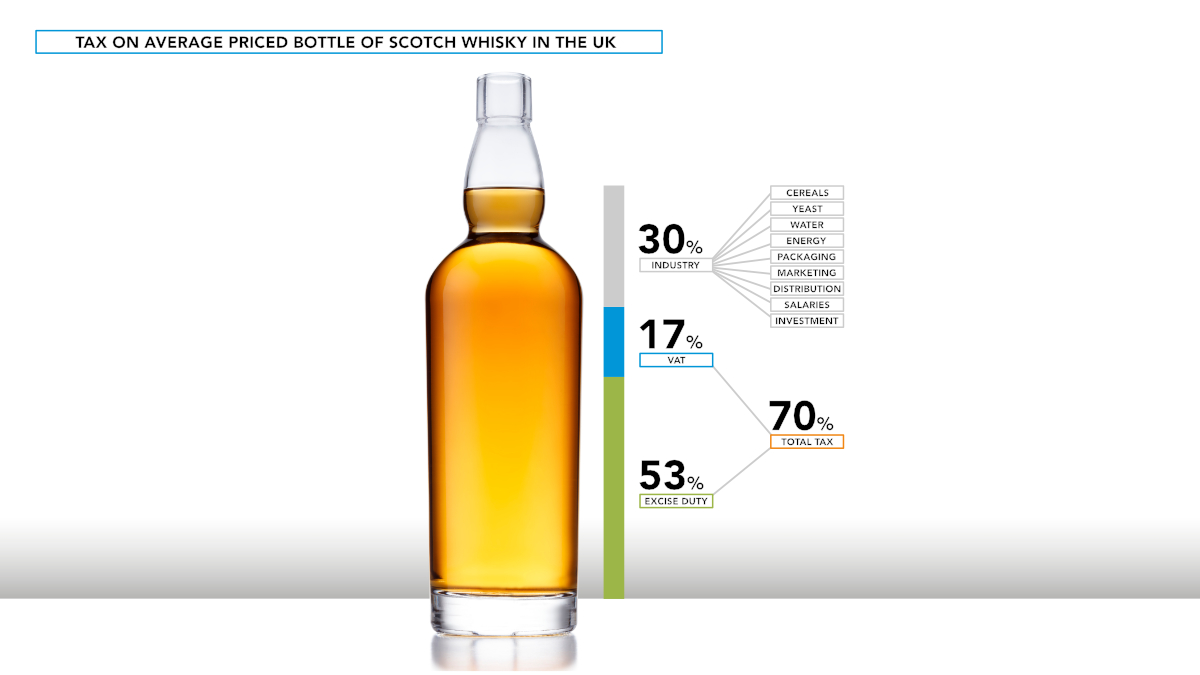Scotch Whisky Tax Hike Delivers Historic Blow: What You Need to Know

Imagine you are a whisky enthusiast who enjoys a glass of Scotch every now and then. You appreciate the history, the diverse flavours and the craftsmanship behind every bottle. Now imagine that the government will increase your favourite drink’s tax by 10.1%, making it more expensive and less accessible for you and millions of other consumers. How would you feel? Angry? Betrayed? Hopeless?
This is not a hypothetical scenario. Last week, Chancellor Jeremy Hunt announced one of the most significant tax hikes on Scotch whisky in recent decades. Starting on April 1st, the duty rate on spirits is set to increase to £31.64 per litre of pure alcohol. As a result, of the £15.22 average price of a bottle of Scotch whisky, £11.40 will be collected in taxation through duty and VAT. Consequently, the tax on an average-priced bottle of Scotch whisky will increase from 70% to 75%.
According to the Scotch Whisky Association, this is a ‘historic blow’ for the Scotch whisky industry, which contributes £6.2 billion to the UK economy and supports more than 42,000 jobs across the UK. The industry has already suffered from trade disputes with the US and EU, which imposed tariffs on Scotch whisky exports in retaliation for UK subsidies to Airbus. The tax increase will further erode the competitiveness and profitability of Scotch whisky producers, small and medium-sized distilleries that rely heavily on the domestic market.
How will the tax hike affect the community?

Source: The Scotch Whisky Association
The tax hike will also hurt the workers and communities that depend on the Scotch whisky industry for their livelihoods. One of these sectors is whisky tourism, which attracts more than two million visitors to Scotland annually and generates £68.3 million in spending. Whisky tourism provides employment opportunities for local guides, drivers, hoteliers, restaurateurs and shopkeepers. However, with higher prices and lower demand for Scotch whisky due to the tax increase, many tourists may choose to visit other destinations or spend less money during their stay.
According to the government, a tax increase is required to finance public services and minimize alcohol-related harm. Nonetheless, these justifications are unconvincing. Firstly, Scotch whisky is already subject to substantial taxation in the UK and contributes more than its fair share of taxes than other alcoholic drinks. Secondly, no concrete evidence exists that increasing alcohol taxes decreases consumption or harm among responsible, moderate drinkers who enjoy Scotch whisky.
As a small business owner, I urge the government to reconsider its decision and reverse the tax increase on Scotch whisky as soon as possible. This would be a sensible move that would benefit not only the industry but also its workers and consumers who love this iconic Scottish product.
Conclusion
The recent tax hike on Scotch whisky in the UK is a significant blow to the industry and the communities that depend on it. It will make whisky more expensive and less accessible for millions of consumers, hurt small and medium-sized distilleries, and negatively impact the whisky tourism sector. While the government claims that the tax increase is necessary to fund public services and reduce alcohol-related harm, it is not convincing. Scotch whisky is already heavily taxed and pays more than its fair share than other alcoholic beverages. No evidence increasing taxes on alcohol reduces harm among moderate drinkers who enjoy Scotch whisky responsibly. The tax hike is a short-sighted decision that risks damaging one of Scotland’s most significant cultural and economic assets.
